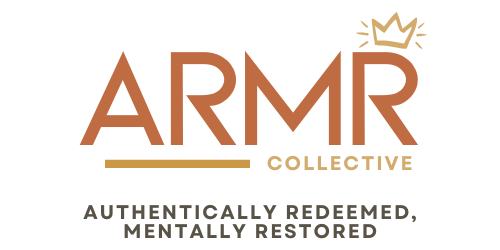I was sitting in church this week when my pastor mentioned Elijah and Ahab, and suddenly God started showing me something about modern pride that I’d never realized before. He spoke about the story of Elijah climbing Mount Carmel to worship God and pray for others while Ahab stayed behind in comfort to eat and drink. How many of us struggle with choosing to fit in but also wanting to stand out for God? Before I launched ARMR Collective, I was terrified of being rejected by friends and scared of what people might think of me. But I knew this was God’s calling for my current stage of life.
Modern pride isn’t just about arrogance anymore. We find ourselves desperate to fit in, especially in this era of social media and comparison culture. But we also want to be the “perfect” Christian and can get stuck with a holier-than-thou attitude. Both are exhausting, and both keep us from an authentic relationship with God and with others. These show up in our faith, social media, mental health journey, daily relationships, affecting all aspects of our lives.
What if the reason we’re so tired isn’t because we’re not doing enough, but because we’re constantly switching between these two masks?
Before we dive in, let me be clear. I’m not talking about the healthy appreciation of who God made you to be. Recognizing your gifts, celebrating growth, or feeling good about accomplishments? That’s actually honoring God’s handiwork in your life. I’m talking about the exhausting performance of modern pride that keeps us from an authentic relationship with God and others, the two faces we wear that leave us feeling either invisible or isolated.
When Fitting In Becomes Our Full-Time Job
The Ahab Mask
Ahab chose to stay behind at the bottom of the mountain to eat and drink in comfort. He chose comfort, conformity, and to do what everyone else was doing while Elijah pursued God. How many of us find ourselves doing the same thing? We long to be accepted and to fit in, but at what cost? Constantly reading the room to adjust ourselves accordingly wears on us.
The Performance Trap
We find ourselves trapped in exhausting performances across every area of our lives. We stay quiet in work meetings to avoid standing out or stay silent about a legitimate work concern just to keep the peace. We might pretend to agree with popular opinions even when we disagree, dressing, acting, and talking like everyone else to fit company culture. This slowly wears us down over time, creating imposter syndrome where we never feel “professional enough” or “smart enough,” holding us hostage and unable to do anything for ourselves.
This same performance pressure follows us everywhere. We post highlight reels that match everyone else’s, curating the perfect social media account. We follow trends even when they don’t fit our personalities, all in the hopes we go viral—the ultimate validation. In our friend groups, it’s easy to get stuck going along with activities and conversations that don’t align with our values. We don’t want to be the “unfun” one or the party pooper, so we hide aspects of ourselves that might make others uncomfortable.
Even in church, this shows up as a performance to look like a “good Christian.” We might have actual questions, doubts, or struggles but keep them smothered deep down to fit in. We use spiritual disciplines, like reading the Bible or praying, as social conformity rather than spiritual growth. The pressure to have the “right” answers or grand testimonies weighs us down.
The Approval Addiction
With social media, the need for validation through likes and comments to feel “normal” creates a comparison trap that never ends. We hide real struggles to maintain the “perfect life” image, desperately seeking approval from others to feel worthy. Being who others want us to be will only exhaust us and create resentment for our true selves.
This approval addiction extends into our parenting, where we hide our struggles so we look like we have it all together and figured out. The competitive undercurrent in mom groups and dad circles can easily wipe us out if we let it. Parent shaming is rampant, and mom guilt threatens to swallow us whole. It’s no wonder we get caught silencing our struggles to appear perfect.
The Comparison Quicksand
We might find ourselves longing for the lives of others. “The grass is always greener on the other side” doesn’t matter when we get stuck looking at the “perfect” Momfluencers, the Pinterest-perfect parents who seem to have it all figured out with their perfect angel children who never throw tantrums. Keeping up with other families’ activities and achievements is a challenge in and of itself. On the opposite end, we might inflate ourselves to keep up with appearances, exaggerating or humble bragging to make ourselves look better.
We hear amazing, miraculous testimonies at church and look at our own and think, “Well, mine’s not that great compared to theirs.” Going to church and talking to God starts to feel like another way for us to fit in instead of using it for our own spiritual growth.
The Universal Cost
Striving so desperately to fit in ultimately causes our mental health to struggle. Anxiety from constant performance and people-pleasing becomes a self-inflicted prison. We can become depressed from living inauthentically. We might bury our true selves so deep we forget who we really are. This causes identity loss from always adapting to others. We’re never able to rest in who we truly are and live with chronic exhaustion. And our relationships build on pretense rather than truth.
But here’s when modern pride gets tricky. When we get exhausted from trying so hard to blend in, we often swing to the complete other side.
When Standing Apart Becomes Standing Above
The Pharisee Mask
The Pharisees were the religious leaders during Jesus’s time on Earth. They were genuinely committed to God, but their pride turned their devotion into a performance that elevated themselves above others. They started to emphasize works over heart posture and essentially started to gatekeep God from the average citizen. No one was holier than them or closer to God than them, in their opinion. Following and living for God is fantastic, but when that becomes a place of pride, the superiority that comes with it can turn people off from Christianity altogether.
This doesn’t just happen in the religious setting either. It can appear in all aspects of our lives.
The Superiority Complex
Jesus said, “They do all their deeds to be seen by others” when speaking about the Pharisees (Matthew 23:5). If we do things just to be perceived a certain way by others, our hearts aren’t in the right place. In the workplace, if we’ve been in the same position for a while, it can be easy to develop intellectual pride and a condescending correction of colleagues. We know deeply about what we’re doing and assume no one else is on the same level as us, whether we realize it or not. We might think, “I work harder and care more than everyone else here.” Instead of using it as a tool, we weaponize our knowledge and experience, holding it over our coworkers’ heads. This creates an “above it all” persona that, in turn, isolates you from your coworkers or teammates.
This same pattern shows up online through the infamous humble-brag: “Ugh, I can’t believe they’re making me choose between St. Lucia and Fiji for my free, all-expenses-paid vacation.” It’s a guise of being authentic or “keeping it real.” When scrolling through our feed, we might make subtle judgments about others’ “fake” posts while performing our own version of “realness.” We use transparency and vulnerability as a badge of honor and have an “at least I’m honest about my struggles” superiority. Social media’s comparison trap goes both ways here: who has the most fantastic life and who is the most humble and vulnerable?
The Gatekeeping Game
With all the judgment and toxicity around parenting and lifestyle choices, it’s no wonder we fall into the mindset of “oh, we don’t do that in OUR family” or “I’d never live like that.” In parenting, we all do what we think is best for our kids, whether it truly is or not. This makes it easy to slip into judging other parents’ choices while humble-bragging about our intentions. “I’m just looking out for you” becomes condescending especially when giving out unwanted “advice.” We start to use our lifestyle choices—all organic, minimalist, screen-free, etc—as moral superiority. We judge other people who don’t live like we do. We might even use our sacrifices as proof of our superior values. “I’m just so exhausted from looking at every single ingredient in our kids’ food. Oh, you don’t do that? Huh.”
Just like the Pharisees, we start to gatekeep people’s salvation and reserve it for those who “deserve” it (spoiler alert: none of us deserve it!). We might use our spirituality to one-up others and develop a “I have a more authentic relationship with God” pride. We assume we’re the end all be all when it comes to God and put ourselves above others. We have the ultimate authority over others and only we can tell others what God wants to tell them.
The Trauma Badge
This becomes a competition about who has the “worst” mental health or who’s been to more therapy sessions. We form our identities and superiority around our traumas and struggles. We view others’ problems as “smaller” or “not as bad.” This mentality keeps us trapped in our own self-concept, never looking outside ourselves or acknowledging others’ legitimate struggles. In the personal growth space, this can look like using self-awareness as a badge of honor rather than a tool for growth.
On the other hand, we might’ve experienced religious trauma or church hurt and use our healing journey as proof we’re more spiritually mature. Our faith has been deconstructed and built back up again, so we must be more in tune with our faith compared to others. Church hurt is real, and the healing journey can be difficult, but we don’t have to hold it over peoples’ heads.
The Universal Cost
Wearing the Pharisaical mask costs us. We become isolated from feeling different or better than others. We can’t ever relate to anyone because we won’t let ourselves. The pressure to maintain the enlightened, aware, or authentic image will eventually become too much. Exhaustion from being everyone’s example or teacher breaks us down. We’ll sit on top of our self-built pedestal all alone, our relationships damaged by our condescension.
The Exhausting Pendulum
You can see how real experiences can easily turn into a place of modern pride if we use it to blend in or to rise above others. We swing back and forth between these two masks; when the Ahab mask gets too tiring, we’ll put on our Pharisee mask and put ourselves above everyone. When that gets too exhausting, we’ll go back to our Ahab mask and mute ourselves to blend in. The cycle goes on: we try to fit in, get tired, swing to superiority, get lonely, and go back to conformity. These are both modern pride, just different expressions. And both keep us from genuine connection and authentic living. James 4:6 says, “God opposes the proud but gives grace to the humble.”
So how do we receive that grace instead?
The Elijah Way: Authentic Pursuit
Climbing Mountains Without Masks
Elijah pursued God, not to fit in with the crowd or to be better than others, but out of genuine relationship and calling. He desired God’s presence and climbed the mountain to serve others, not to elevate himself. He was set apart but not superior; his differences served a purpose beyond himself. He was authentic in his struggles with depression, fear, and loneliness without making them his identity. He pursued God privately before he ever ministered publicly.
How can we follow Elijah’s example?
Authentic Expression
Instead of curating the perfect social media profile or performing authenticity, we can post what’s true without needing to prove anything to anyone. If we do share our struggles, we can do so to normalize and help others, not to build our “real” brand. When others have wins, we can celebrate without comparison or secret judgment. We’re free to be ourselves—genuinely ourselves—without performing for or against others.
This authentic expression flows into our work lives too. Instead of using our skills and knowledge to prove our worth, we can bring them to our projects and people. If we have something valuable to contribute, we can speak up and stay quiet if we don’t. We no longer need to diminish others and can be confident in our abilities. We can take credit where it’s due, share it generously, and admit mistakes readily. We can’t control others’ perceptions of ourselves; we can only control how we show up as our best selves.
Serving Others, Not Ourselves
When we’re with our friends, this looks like listening to understand rather than to prove we care more or know better. If friends try to start an unspoken competition, we can be firm in setting boundaries without superiority or people-pleasing. Instead of trying to one-up each other or downplaying ourselves, we can genuinely connect.
Even in our faith lives, this shifts everything. Instead of pursuing God for performance or points, we can pursue Him for a genuine relationship. Instead of making our doubts and struggles our identity, we can be honest about them and seek growth. When we focus on our spiritual growth, we don’t have to keep a score against others. In Philippians 2:3, Paul writes, “Do nothing from selfish ambition or conceit, but in humility count others more significant than yourselves.” We can serve others, not to prove our worth, but to genuinely help as Jesus did.
Growth for the Right Reasons
Seeking therapy, medication, or support isn’t a weakness or a badge anymore, but wisdom in knowing how to prioritize your wellbeing. We can do the internal healing and growth work for ourselves and not to prove anything. If we have bad days, we can be honest about them without making them our whole story. We’re all learning and growing; we don’t have to keep score against others and be the “most” hurt, mentally ill, or self-aware.
What This Freedom Feels Like
When we live genuinely, we don’t have to worry about the exhaustion from mask-switching. Our relationships are built on truth rather than image, and we don’t have anxiety from trying to maintain a persona. This leaves us with more energy for what actually matters. We’re allowed to be human while continuing to grow.
Practical Steps for Everyday Freedom
Your Daily Mount Carmel Moments
In every situation, we can choose between Ahab’s conformity, Pharisee superiority, or Elijah’s authentic pursuit.
Real-Time Mask Checks
We can check ourselves to see if we have a mask on. For an Ahab face check, we can ask ourselves, “Am I doing or saying this to fit in or avoid judgment?” To make sure we’re not slipping into Pharisaical superiority, we can ask ourselves, “Am I doing or saying this to feel better than others?” If we’re living like Elijah, we can answer yes to, “Am I doing this out of genuine love and authenticity?”
By asking ourselves, “which face am I wearing in this situation?” we’re able to find our underlying motivation and adjust accordingly. What would an authentic response look like here? When we do something, we can ask, “Am I trying to prove something or just be myself?” And if we’re not sure of something, we can wonder what we would do if no one was watching or judging us.
Daily Authenticity Practices
Authenticity becomes a daily practice of small choices. Post what’s true without needing validation. Listen to friends without competing or one-upping. Celebrate others’ wins without comparison. Ask questions at work without shame about what we don’t know. Set boundaries for our actual needs, not to prove a point. Admit mistakes without self-hatred. Seek help—therapy, medication, support—as wisdom, not weakness or achievement. Pursue God to strengthen the relationship, not for public recognition. When we serve others, it comes from love rather than proving our worth.
When we pursue growth, it’s for ourselves, not to establish credentials. We can rest without guilt and grow at our own pace without keeping score against anyone else. We’re free to grow at our own pace without comparison.
Warning Signs You’re Slipping
We can stay alert by recognizing a few warning signs that we’re slipping back into a place of pride. Exhaustion from constantly managing our images or resentment towards others for their success can indicate our hearts aren’t in the right place. If we start to feel invisible or isolated in relationships or make everything about proving rather than just being, we might be headed back to a prideful place.
The View From the Mountain
That Sunday morning when my pastor mentioned Elijah and Ahab, I had no idea God was about to expose the exhausting game I’ve been playing. I still find myself comparing, performing, swinging between those two masks. But now at least I know what I’m doing and what to look out for.
The Freedom We’re All Looking For
When we climb mountains for the right reasons, we see everything clearly—including ourselves. Just like Elijah climbing Mount Carmel to spend time with God and pray for others, we can choose to live authentically for God without feeling the need to perform. We don’t have to choose between being fake or superior any longer. Our real selves are worthy of love and belonging no matter how many struggles, questions, or imperfections we have. When we stop performing, we actually become more interesting, not less. We become the people God actually created us to be.
Your Mountain is Waiting
This week, I challenge you to catch yourself in the act. Which face are you wearing right now? In your next work meeting, social media post, conversation with friends, or even in church, ask yourself: “Am I trying to blend in, stand above, or just be genuinely me?”
Elijah climbed Mount Carmel not to impress anyone, but to intercede for them.
When we stop performing and start living authentically, we discover that’s exactly what the world needs from us too—not our perfect image or superior wisdom, but our genuine hearts pursuing something bigger than ourselves.
What’s your Mount Carmel moment today?



